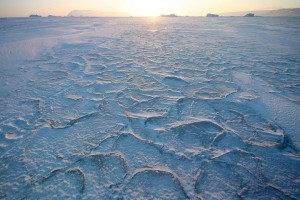The Department Of Interior's Contradictory Policies On Arctic Drilling
 In a decision yesterday on offshore drilling in the Arctic, the Department of Interior undermined its own authority on regulating potentially devastating oil spills in the region.
In a decision yesterday on offshore drilling in the Arctic, the Department of Interior undermined its own authority on regulating potentially devastating oil spills in the region.Just like the cleanup of an oil spill in the Arctic, the permitting process is extraordinarily complicated — for a good environmental reason. It just got more complicated. But not in a good way.
As the government considers the logistics of Shell’s offshore Arctic drilling plans, it has created two different standards that could impact the ability to respond to a blowout or spill.
Last December, the Interior Department’s Bureau of Ocean Energy Management (BOEM) conditionally approved Shell Oil’s Exploration Plan to accompany its plans to drill exploratory wells in the Chukchi Sea off Alaska’s North Slope. In so doing, BOEM took the reasonable step of shortening the approved drilling season by 38 days to ensure that if a spill occurred toward the end of the season, the company would still have time to clean it up before darkness, cold, and encroaching ice made the task impossible.
In approving Shell’s Beaufort Sea Oil Spill Response Plan, the agency’s Bureau of Safety and Environmental Enforcement (BSEE) touted this reduction as a key element of ensuring adequate spill response capabilities.
But yesterday, BSEE approved Shell’s Oil Spill Response Plan for its proposed operations in the Beaufort Sea – for a drilling season extending through October 31st. The announcement, heralded by Shell as a “major milestone” in its effort to begin exploratory drilling in the Arctic Ocean this summer, came with assurances from BSEE Director James A. Watson that the organization’s “focus moving forward will be to hold Shell accountable.”
Yet, the inherent contradiction of allowing drilling to continue until November in the Beaufort when it would be shut down in late September in the Chukchi leads us to question the strength of the standard by which accountability will be measured. There’s no reason to think that if drilling is unsafe in one part of the Arctic in October, it would be safe in another.
Perhaps more importantly, yesterday’s approval will make it more difficult for the administration to defend its position from Shell’s challenge that a shorter Chukchi season is unnecessary. Shell spokesman Curtis Smith has already stated that this is a fundamental point of contention in the company’s challenge to the shorter Chukchi Season:
[The shortened season] would have a significant effect. We believe the restriction is unwarranted. There is no such restriction in our approved Plan of Exploration for the Beaufort Sea, and we are confused as to why it would be imposed for the Chukchi Sea.
As detailed in the recent Center for American Progress Report, Putting a Freeze on Arctic Ocean Drilling: America’s Inability to Respond to an Oil Spill in the Arctic, any response effort would be severely hamstrung by the lack of infrastructure in place: the nearest permanent Coast Guard facility is over 1,000 miles away and there are no major roads, railroads, or ports along the North Slope. Further, weather conditions in the Arctic are extreme and often unpredictable. Allowing Shell to continue drilling until the region ices over significantly compromises the capacity to respond to a late-season blowout or spill.
For example, the “monster storm” that pummeled Alaska last year and prompted Gov. Parnell to declare a state of emergency hit just over a week after Shell’s proposed drilling season end date for the Beaufort. The brutal storm covered an area twice the size of Texas, produced hurricane-force winds, blizzard conditions, and coastal flooding, and spurred evacuations of many coastal communities. Any response effort would be impossible in such conditions. If safety and preparedness are indeed priorities, Shell’s plans should reflect that reality.
Granted, Shell has already been required to suspend drilling operations in the Beaufort from August 25 through the end of Alaskan natives’ subsistence bowhead whale hunt season. Shell clearly doesn’t want to operate with additional restrictions. If a similar 38-day reduction were imposed in the Beaufort, it would effectively mean all operations would have to stop in late August, which could threaten the economic viability of operations entirely.
But that can’t be the reason the Beaufort drilling season was extended. Could it?
You can return to the main Market News page, or press the Back button on your browser.

